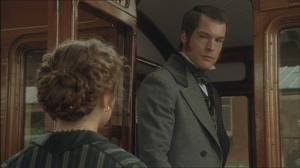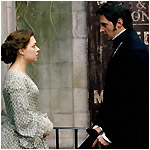Lately I’ve been thinking about Elizabeth Gaskell’s North and South, and Jane Austen’s Pride and Prejudice.
In both these stories, the heroine receives a proposal of marriage from the hero half-way through the book, and she says “no.”
Now, we know he’s the hero and that he’s right for her and it’s all going to be sunshine and rainbows when they get together. So what’s wrong with her? You’d think they’d get to their happily ever after a lot faster if she wouldn’t be so stubborn and irrational.
But the heroine has to say No. She HAS to. It’s vital, because we learn what kind of man the hero is from his reaction to her rejection.
Does he hear her when she says No?
Does he respect her right to reject him, however much he might disagree with her decision?
Does he treat her fairly and with respect even though he’s hurt?
During the 1800s, women were not as independent as they are now. Most women went from living under the control of their fathers, to living under the control of their husbands. Their lives were ordered and decisions were made for them by the men they were closest to. From birth to death, a woman had literally no opportunity to say No to any major life decision, and make it stick.
Except one: She had the opportunity to say No to an unwanted marriage proposal.
Well, her family might still badger, argue with and pressure her, but she could say No.
Furthermore, saying no and meaning it is an important message that is shared in these stories. Both books give examples of the wrong way and the right way for a man to take rejection – because hearing and respecting her No is essential.
In Pride and Prejudice, we see Lizzie Bennet rejecting Mr. Collins’ proposal. She says No, and he won’t accept it. He gives her a big long speech about how she doesn’t mean what she says, ending with, “As I must therefore conclude that you are not serious in your rejection of me, I shall choose to attribute it to your wish of increasing my love by suspense, according to the usual practice of elegant females.”
He refuses to listen to her repeated message that No means No.
Darcy, although he’s astonished and angry about it, hears her No. He doesn’t tell her that he knows better or that she doesn’t really mean it. Instead, he gets control of his emotions and asks her why.
At length, with a voice of forced calmness, he said: “And this is all the reply which I am to have the honour of expecting! I might, perhaps, wish to be informed why, with so little endeavour at civility, I am thus rejected. But it is of small importance.”
Lizzie sets out her reasons. Darcy doesn’t like her reasons, but he doesn’t try to argue her out of her position – he leaves, and then sends her a letter. He gives her his perspective, and space in which to think about the situation.
Darcy’s handling of his rejection shows how he might handle other disagreements that might arise between himself and Lizzie. He can listen to her viewpoint and respect her as a thoughtful person – an equal. That’s a far better indicator of marital happiness than physical attractiveness, personal charm, or a ton of money would be.
In North and South, Margaret first receives a proposal from Henry Lennox, longtime friend of the family and a respectable lawyer. We know Henry is a decent guy because he respects Margaret’s refusal.
We know that Margaret has thought about the pros and cons of marrying Henry. She doesn’t feel ready for marriage. She also doesn’t like certain aspects of Henry’s personality. On that basis, she is entitled to say No to his proposal – even though it could be argued that Henry might well be her last best hope for marriage and stability. But still she’s entitled to make that decision for herself.
John Thornton also respects Margaret’s No. He argues with her, calls her unfair and unjust, but he has heard her. He accepts her refusal. And he tells her that she has nothing to fear from him:
“I have never loved any woman before: my life has been too busy, my thoughts too much absorbed with other things. Now I love, and will love. But do not be afraid of too much expression on my part.”
The turning-point in John and Margaret’s relationship comes later, when John protects her reputation. When she lies to the policeman investigating the suspicious death of one Leonards, John knows that she lied. He thinks she is protecting a secret lover. But because he still loves her, he helps to keep the secret of her presence at the train station where Leonards died.
We know that Margaret has lied to keep the police from knowing that her brother, who is under a sentence of death for mutiny, has returned to England to see their mother one last time before she dies. John doesn’t know this, but he is the magistrate assigned to Leonards’ case.
Margaret’s involvement is only a side-issue in discovering how Leonards died. It’s not really critical in resolving the case. So basically, Magistrate John Thornton has the power to make Margaret’s life difficult or easy. He chooses to make her life easier, even though he doesn’t have to. That indication of his character helps Margaret to realize that he is worthy of her love.
Lately, I’ve been seeing a lot of posts in which young women feel pressured not to say No. Saying No makes you a bitch. You can’t “friend-zone” a guy because that’s so mean. When someone asks you out on a date, you have to give them something in return for the meal or entertainment or whatever, because that’s only fair. And once a young woman has said “yes” to one thing, apparently she’s automatically said yes to everything else. Frankly, I think that’s frightening.
Our ancestresses knew the power of No. They also knew what a man’s response to No said about his character.
Don’t give up the power.




Pure awesome!
Thanks!
I’m going to agree with the general point (urging young women not to be afraid to say “no”) but disagree a little with the genealogy of the point traced here. Both of these books tell idealized stories that treat the lives of upper class women (not upper upper-most, but still women who are privileged far beyond the average woman’s lives of the eras they depict). In terms of actual historical experiences, most women in western society didn’t really have the right to say “no” with any power to enforce it — they could say “no” but their refusal didn’t matter. (Great book on this: Laura Gowing, Common Bodies.) The capacity of any young woman to say “no” and have her refusal believed and then have her right to say “no” supported effectively in law is really a development of the twentieth century and particularly of the postwar period.
Yes, the stories are idealized. They’re fiction, and not reflections of actual life in those time periods. However, I think that both stories make the point that women should stand up for themselves.
And even though our ancestresses (as I’ve called them) didn’t really have much power to say no, I think they knew that it was a powerful thing.
Nowadays, however, women do have a greater right to say no, and it’s just been bothering me to see that there are some young women who seem to be unaware of it, or who seem to be voluntarily giving away the power that they should be zealously guarding.
I don’t disagree but I don’t think the whole burden lies on young women, either. We also need to teach young men to behave sensitively and correctly and to recognize boundaries without women’s need to enforce them constantly.
That’s true, too. It shouldn’t be all on the women’s shoulders.
Maybe part of what’s bugging me is the way that saying “no” is hypermoralized (in both these stories, but especially in P&P — the Wickham story with the Bennets’ daughter — is it Lydia?). It’s hard for me to talk about “saying no” in P&P without considering the problems of the girl who said “yes.” That’s accurate to its age — the portrayal of the younger daughter’s refusal to hold the line, her mesalliance, and its social consequences — but I’m troubled by an idealization of Elizabeth Bennet’s “no” that doesn’t problematize the whole Wickham plot strand.
You’re right that both stories carry the message that saying “no” is good and saying “yes” is bad (or that “yes” can only be said under certain carefully controlled circumstances).
And it is unfair that women are always the ones who are supposed to put the brakes on, the ones who have to say no even when they’d rather say yes.
Furthermore, I’ve seen current-day complaints about society’s dictates on how women should be: If she says no, she’s a prude, if she say’s yes she’s a slut; if she won’t eat much, she’s weight-obsessed, if she eats, she’s going to be fat; if she wears make-up, she’s too artificial, if she doesn’t wear make-up, she’s not taking care of herself… on and on, young women seem to get whipsawed by these contradictory messages.
That’s why I see saying “no” as empowering. A woman should have the right to follow her own inclinations no matter what the messages from society might be.
I guess I grew up being told I was responsible for saying “no” and if I didn’t, terrible things would happen to me and others. I personally find saying “yes” way more empowering than saying “no” and when I learned I could say “yes” when I wanted to, my enjoyment of my own life improved drastically. Even if in the end, one gets punished for that on some level. How about we create a world in which we let young women say “yes” or “no” as they please — and take away the punishment? That would be my preference. 🙂
Speaking as one who once believed that saying “yes” to make others happy would make me happy too, I’d like to be in a world where we could all be free to say yes or no as we pleased, without fear of punishment.